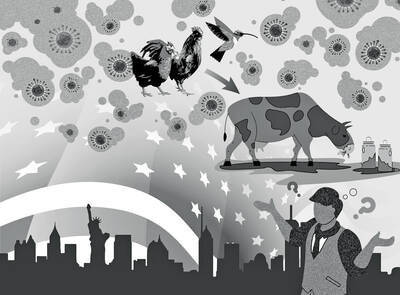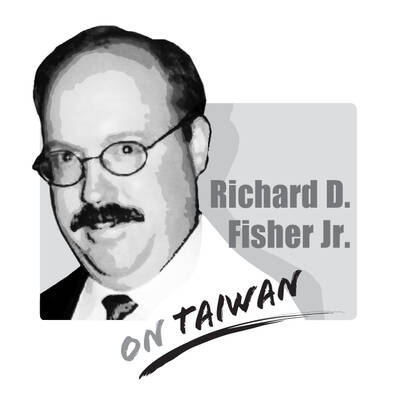I read with some dismay about Taipei's plans to fine bicyclists who fail to adhere to traffic laws.
The report cited an increasing number of bicycle-related injuries annually as the motivation for this crackdown on cyclists, with last year's number of such accidents totalling 885. What concerns me is that it appears cyclists are being singled out as the sole cause of such accidents and thus solely deserving of reprimand.
I recently acquired an excellent bicycle from Giant of Taiwan, and have been riding extensively around Taipei while working on music projects here. In all my experiences cycling in countries such as the US, Canada, Germany, Austria and Italy, I have never experienced cycling like here in Taipei. From my observations, the greatest risk to cyclists are taxi drivers -- who seem to believe they are the masters of the roadway -- and city buses seemingly anxious to stay on schedule.
I have been repeatedly cut off by both and no measure of safe distancing seems to prevent this danger.
I have also noticed a glaring absence of planning and infrastructure for bicycles in Taipei. I do recognize and applaud the work Taipei has done for creating bicycle paths along the rivers and I have biked from Taipei to Danshui on many occasions. But within Taipei itself, there are no bicycle lanes that I have seen and cyclists are simply left to do battle with the traffic at large.
Leaving cyclists to fend for themselves on Taipei's aggressive roadways will undoubtedly result in the cyclist losing that competition again and again; hence the soaring accident rate. Perhaps it would be more suitable to consider how to better accommodate cyclists in Taipei.
I commend Taipei Mayor Hau Lung-bin's (
However, if Hau truly wishes to support and promote cycling in Taipei -- which in turn contributes to improving the air quality in one of Taiwan's smoggiest cities -- I hope he will do more than simply restrict fines to the most errant of bicyclists. I encourage him to thoroughly review Taipei's roadways from a bicycling perspective, consult with cities in foreign countries and bring real improvement to this city's traffic system.
I also invite him to get on his bicycle and give me a call. I'll be happy to ride with him through the "wild west" of Taipei's busier streets in an effort to give him some first-hand experience of what combat-cycling in Taipei is like.
Matthew Lien
Taipei

The bird flu outbreak at US dairy farms keeps finding alarming new ways to surprise scientists. Last week, the US Department of Agriculture (USDA) confirmed that H5N1 is spreading not just from birds to herds, but among cows. Meanwhile, media reports say that an unknown number of cows are asymptomatic. Although the risk to humans is still low, it is clear that far more work needs to be done to get a handle on the reach of the virus and how it is being transmitted. That would require the USDA and the Centers for Disease Control and Prevention (CDC) to get

For the incoming Administration of President-elect William Lai (賴清德), successfully deterring a Chinese Communist Party (CCP) attack or invasion of democratic Taiwan over his four-year term would be a clear victory. But it could also be a curse, because during those four years the CCP’s People’s Liberation Army (PLA) will grow far stronger. As such, increased vigilance in Washington and Taipei will be needed to ensure that already multiplying CCP threat trends don’t overwhelm Taiwan, the United States, and their democratic allies. One CCP attempt to overwhelm was announced on April 19, 2024, namely that the PLA had erred in combining major missions
On April 11, Japanese Prime Minister Fumio Kishida delivered a speech at a joint meeting of the US Congress in Washington, in which he said that “China’s current external stance and military actions present an unprecedented and the greatest strategic challenge … to the peace and stability of the international community.” Kishida emphasized Japan’s role as “the US’ closest ally.” “The international order that the US worked for generations to build is facing new challenges,” Kishida said. “I understand it is a heavy burden to carry such hopes on your shoulders,” he said. “Japan is already standing shoulder to shoulder
Former president Chiang Ching-kuo (蔣經國) used to push for reforms to protect Taiwan by adopting the “three noes” policy as well as “Taiwanization.” Later, then-president Lee Teng-hui (李登輝) wished to save the Chinese Nationalist Party (KMT) by pushing for the party’s “localization,” hoping to compete with homegrown political parties as a pro-Taiwan KMT. However, the present-day members of the KMT do not know what they are talking about, and do not heed the two former presidents’ words, so the party has suffered a third consecutive defeat in the January presidential election. Soon after gaining power with the help of the KMT’s